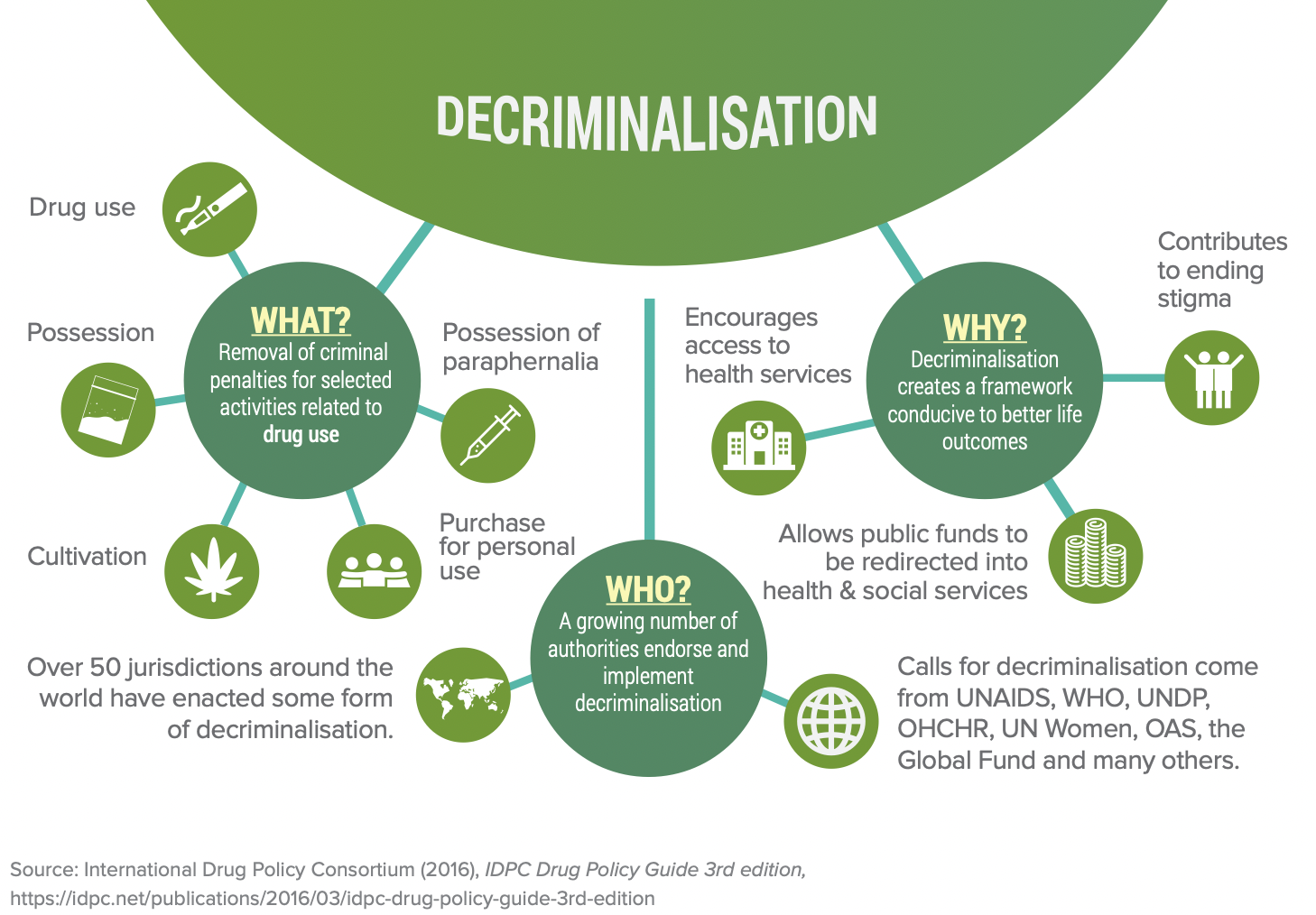8.1 What is Decriminalization?
The gold standard of decriminalization “is removing all sanctions for the use of all controlled substances (those restricted by the international and national drug control regimes) and related activities and achieving improved outcomes for public health and human rights” (IDCP, 2022, p. 8).

Falling short of the “gold standard” of decriminalization outlined by the International Drug Policy Consortium (IDPC) (2022), the concept of decriminalization has generally been used to refer to a range of policies that aim to reduce the negative impact of prohibitionist policies for PWUS (Greer et al., 2022; Jesseman & Payer, 2018). In practice, decriminalization policies involve the elimination or substantial reduction of penalties for possessing small amounts of an otherwise illegal/controlled substance (MacCoun & Reuter, 1999; Jesseman & Payer, 2018). Possession is usually the focus of decriminalization efforts, with manufacture and trade remaining illegal.
Among the wide range of decriminalization policies that exist, there are various outcomes that can result from being found in possession of a controlled substance. Whether or not there are penalties associated with simple possession (possession for personal use, with no intent to sell), depends on how the policy is formulated. Policies can range from full decriminalization (i.e., no penalties) to policies that include civil/non-criminal penalties (i.e., fines), or diversion (i.e., referral to education, social and/or health services) (Greer, et al., 2022; Jesseman & Payer, 2018; Stevens et al., 2019).
There are two forms of decriminalization policies, de facto and de jure. One involves changes to the legislation, while the other does not. Under a de facto decriminalization framework, an administrative decision has been made to not prosecute certain acts, usually simple possession of a controlled substance (IDPC, 2022; Jesseman & Payer, 2018; Stevens et al., 2019). Since there is no legislative change, possession technically remains illegal, but is assigned a low priority by police and the criminal justice system (CJS). The roots of the Dutch Coffeeshop model provide an example of a de facto form of decriminalization (Stevens et al., 2019).
In contrast, de jure decriminalization involves amendments to criminal legislation. In the case of substance use, criminal legislation is typically modified to permit simple possession (IDPC, 2022; Jesseman & Payer, 2018; Stevens et al., 2019), although decriminalization frameworks can include more than simple drug possession (for examples see the IDPC 2022 discussion of the gold standard of drug decriminalization; and the proposed changes to Canadian policy detailed in the CDPC report, 2022). The 2001 changes to Portuguese criminal law, making possession of up to a 10-day supply of any illegal substance an administration offence, is an example of de jure decriminalization (Jesseman & Payer, 2018).
Some benefits of adopting decriminalization polices include:
- Respecting human rights by promoting social inclusion of PWUS (IDCP, 2022).
- Reducing socio-economic costs of criminalization on the individual, including helping PWUS maintain jobs and housing (IDCP, 2022).
- Reducing drug-related arrests and the associated CJS costs tied to police, courts, and corrections (Bonn, 2020).
- Reducing social harm caused by drug criminalization/prohibition (IDPC, 2021).
- Improving health outcomes for PWUS, through the availability of inclusive, non-judgmental, harm reduction, treatment and intervention, and general health services (IDPC, 2022).
Click the links below to learn more about drug decriminalization:
Decriminalizing People Who Use Drugs: A Primer for Municipal and Provincial Governments (Download and read the document)
The Decriminalisation of People Who Use Drugs: An Essential Component of a Human Rights-Based Approach to Drug Policy (Download and read Submission in English)
VIDEO: Calls to Decriminalize Drugs Grow Louder During Pandemic
The following video illustrates the increasing support for decriminalization among Canadians during the Covid-19 pandemic.

